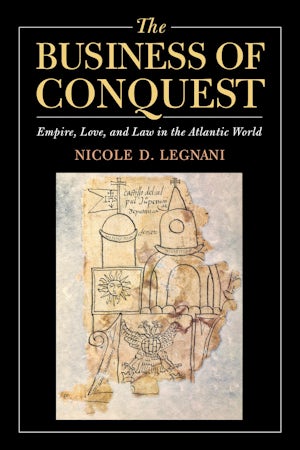The University of Notre Dame
Press is publishing “The Business of Conquest - Empire, Love, and Law in the
Atlantic World”.
ABOUT THE BOOK
The Spanish conquest has long
been a source of polemic, ever since the early sixteenth century when Spanish
jurists began theorizing the legal merits behind native dispossession in the
Americas. But in The Business of Conquest: Empire, Love, and Law in the
Atlantic World, Nicole D. Legnani demonstrates how the financing and
partnerships behind early expeditions betray their own praxis of imperial power
as a business, even as the laws of the Indies were being written. She
interrogates how and why apologists of Spanish Christian empire, such as José
de Acosta, found themselves justifying the Spanish conquest as little more than
a joint venture between crown and church that relied on violent actors in
pursuit of material profits but that nonetheless served to propagate
Christianity in overseas territories. Focusing on cultural and economic factors
at play, and examining not only the chroniclers of the era but also laws,
contracts, theological treatises, histories, and chivalric fiction, Legnani traces
the relationship between capital investment, monarchical power, and imperial
scalability in the Conquest. In particular, she shows how the Christian virtue
of caritas (love and charity of neighbor, and thus God) became confused with
cupiditas (greed and lust), because love came to be understood as a form of
wealth in the partnership between the crown and the church. In this
partnership, the work of the conquistador became, ultimately, that of a
traveling business agent for the Spanish empire whose excess from one venture
capitalized the next. This business was thus the business of conquest and
featured entrepreneurial violence as its norm—not exception.
The Business of Conquest offers
an original examination of this period, including the perspectives of both the
creators of the colonial world (monarchs, venture capitalists, conquerors, and
officials), of religious figures (such as Las Casas), and finally of indigenous
points of view to show how a venture capital model can be used to analyze the
partnership between crown and church. It will appeal to students and scholars
of the early modern period, Latin American colonial studies, capitalism,
history, and indigenous studies.
ABOUT THE AUTHOR
Nicole D. Legnani is assistant
professor of Spanish and Portuguese at Princeton University. She is the
translator of Titu Cusi: A 16th-Century Account of the Conquest.
More info here


No comments:
Post a Comment